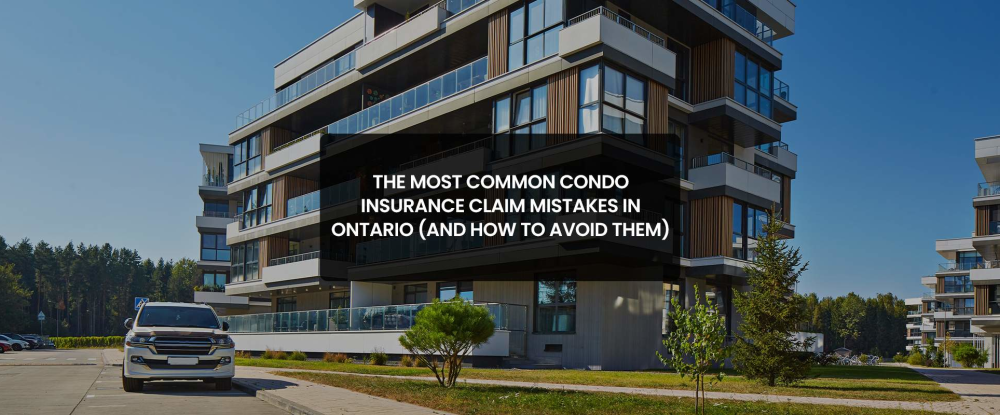
For property owners, handling a condo insurance claim in Ontario can feel overwhelming. Without a clear understanding of the process, you may run into frustrating delays, repeated requests for information, or even the unwelcome news of a denied claim. This happens often because many people underestimate the amount of detail, documentation, and procedure required. When a claim goes wrong, an already stressful situation can quickly become a financial burden.
To help you avoid those pitfalls, here is an in-depth look at the most common mistakes condo owners make during a claim, along with practical steps to prevent them. By knowing what to watch out for, you can approach your claim with greater confidence and a clear sense of direction.
One of the top reasons for delayed or denied claims is a lack of detail. When you are dealing with property damage, it is easy to overlook items or provide only vague information. A poorly documented claim can cause your insurer to question the extent of the damage or the value of your belongings. This may require an additional inspection from an adjuster, adding weeks to the process and delaying reimbursement.
How to avoid it: – Before contacting your insurer, take time to gather all relevant information. Write a factual account of the incident, including the date, time, location, and exactly how the damage occurred. List every damaged item and take high-quality, clear photos and videos from multiple angles. If you already have a home inventory, you will be at a major advantage. This record should include photos, estimated values, receipts if available, and a description of each item. A complete inventory not only proves ownership but also speeds up claim processing.
Most condo insurance policies in Ontario require claims to be reported within a specific time frame. Waiting too long may be considered a breach of your policy and could result in a denial. Delays also make it harder for your insurer to confirm the cause and extent of the damage. For example, a small leak left unreported for weeks could lead to mold growth, which the insurer might argue could have been prevented with a prompt report.
How to avoid it: Report damage to your insurer as soon as you discover it. Acting quickly allows them to start their investigation and can prevent further deterioration of your property. If the damage affects common areas or another unit, contact your condo corporation or property manager immediately. Their insurance may also need to be involved, and their policy may have separate time limits for reporting.
It is natural to want to fix damage immediately, especially if it impacts your comfort or safety. However, starting large repairs without your insurer’s consent can jeopardize your claim. Your insurance company needs to inspect the damage before approving work. If you repair or replace items too early, you may destroy crucial evidence and risk losing reimbursement.
How to avoid it: Take only the steps necessary to prevent further damage, such as shutting off water to stop a leak, boarding up a broken window, or cleaning up standing water. Do not proceed with major repairs until your claims adjuster gives written approval. In many cases, insurers have preferred contractors they work with, and using one of them can help streamline the process.
One of the most significant and confusing mistakes condo owners make is assuming that their condo corporation’s policy covers everything. In reality, the corporation’s insurance typically covers the building’s structure, shared spaces, and original standard unit finishes. Your personal condo insurance covers your belongings, any upgrades or improvements you have made, and personal liability. Many owners also do not realize that they may be responsible for paying part of the corporation’s deductible in certain situations.
How to avoid it: Ask your condo corporation for a copy of its bylaws and “standard unit description.” This document clarifies what the corporation’s policy covers and what you are responsible for. Make sure your personal condo insurance includes coverage for these gaps. You may also want to add “loss assessment” coverage to protect yourself if you are required to contribute toward the corporation’s deductible after a large building-wide claim.
Documentation is your strongest protection in a claim dispute. Without thorough evidence, you may struggle to prove the extent of your loss or to support your account of events. Incomplete records can give your insurer grounds to deny your claim.
How to avoid it: Maintain detailed, time-stamped photos and videos of all damage before any cleaning or repairs begin. Keep a written log of every interaction with your insurer, including names, dates, and times. Save all claim forms, emails, receipts, and repair estimates in one place. This paper trail establishes a clear timeline and provides proof if your claim is challenged.
The condo insurance claim process does not have to be chaotic or stressful. By knowing your policy inside and out, understanding your condo corporation’s coverage, and documenting every detail, you can reduce delays and improve your chances of a successful outcome. Proactive preparation is key—have a home inventory, know your reporting deadlines, and never make assumptions about what is covered.
At Begin Insurance, we understand that dealing with insurance matters can feel complicated, especially when dealing with the claims process. We aim to make things simple, clear, and stress-free for condo owners in Ontario. We work closely with clients to ensure their coverage meets their needs, whether that means reviewing an existing policy or finding a new one.
We compare policies from top Canadian insurance providers, helping our clients choose the right protection for their home, condo, rental unit, or secondary property. We also review options for additional coverage for high-value items, collections, sports equipment, flooding, sewer backup, or expanded personal liability. Contact us today, to know more.